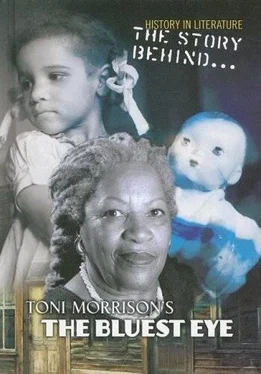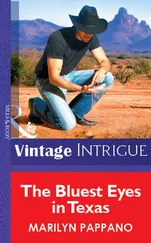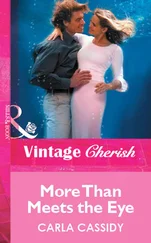Knowing that there was such a thing as outdoors bred in us a hunger for property, for ownership. The firm possession of a yard, a porch, a grape arbor. Propertied black people spent all their energies, all their love, on their nests. Like frenzied, desperate birds, they overdecorated everything; fussed and fidgeted over their hard-won homes; canned, jellied, and preserved all summer to fill the cupboards and shelves; they painted, picked, and poked at every corner of their houses. And these houses loomed like hothouse sunflowers among the rows of weeds that were the rented houses. Renting blacks cast furtive glances at these owned yards and porches, and made firmer commitments to buy themselves "some nice little old place." In the meantime, they saved, and scratched, and piled away what they could in the rented hovels, looking forward to the day of property. Cholly Breedlove, then, a renting black, having put his family outdoors, had catapulted himself beyond the reaches of human consideration. He had joined the animals; was, indeed, an old dog, a snake, a ratty nigger. Mrs. Breedlove was staying with the woman she worked for; the boy, Sammy, was with some other family; and Pecola was to stay with us. Cholly was in jail. She came with nothing. No little paper bag with the other dress, or a nightgown, or two pair of whitish cotton bloomers. She just appeared with a white woman and sat down. We had fun in those few days Pecola was with us. Frieda and I stopped fighting each other and concentrated on our guest, trying hard to keep her from feeling outdoors. When we discovered that she clearly did not want to dominate us, we liked her. She laughed when I clowned for her, and smiled and accepted gracefully the food gifts my sister gave her. "Would you like some graham crackers?"
"I don't care."
Frieda brought her four graham crackers on a saucer and some milk in a blue-and-white Shirley Temple cup. She was a long time with the milk, and gazed fondly at the silhouette of Shirley Temple's dimpled face. Frieda and she had a loving conversation about how cu-ute Shirley Temple was. I couldn't join them in their adoration because I hated Shirley. Not because she was cute, but because she danced with Bojangles, who was my friend, my uncle, my daddy, and who ought to have been soft-shoeing it and chuckling with me.
Instead he was enjoying, sharing, giving a lovely dance thing with one of those little white girls whose socks never slid down under their heels. So I said, "I like Jane Withers." They gave me a puzzled look, decided I was incomprehensible, and continued their reminiscing about old squint-eyed Shirley. Younger than both Frieda and Pecola, I had not yet arrived at the turning point in the development of my psyche which would allow me to love her. What I felt at that time was unsullied hatred. But before that I had felt a stranger, more frightening thing than hatred for all the Shirley Temples of the world. It had begun with Christmas and the gift of dolls. The big, the special, the loving gift was always a big, blue-eyed Baby Doll. From the clucking sounds of adults I knew that the doll represented what they thought was my fondest wish. I was bemused with the thing itself, and the way it looked. What was I supposed to do with it?
Pretend I was its mother? I had no interest in babies or the concept of motherhood. I was interested only in humans my own age and size, and could not generate any enthusiasm at the prospect of being a mother. Motherhood was old age, and other remote possibilities. I learned quickly, however, what I was expected to do with the doll: rock it, fabricate storied situations around it, even sleep with it. Picture books were full of little girls sleeping with their dolls. Raggedy Ann dolls usually, but they were out of the question. I was physically revolted by and secretly frightened of those round moronic eyes, the pancake face, and orangeworms hair. The other dolls, which were supposed to bring me great pleasure, succeeded in doing quite the opposite. When I took it to bed, its hard unyielding limbs resisted my flesh-the tapered fingertips on those dimpled hands scratched. If, in sleep, I turned, the bone-cold head collided with my own. It was a most uncomfortable, patently aggressive sleeping companion. To hold it was no more rewarding.
The starched gauze or lace on the cotton dress irritated any embrace. I had only one desire: to dismember it. To see of what it was made, to discover the dearness, to find the beauty, the desirability that had escaped me, but apparently only me. Adults, older girls, shops, magazines, newspapers, window signs-all the world had agreed that a blue-eyed, yellow-haired, pink-skinned doll was what every girl child treasured. "Here," they said, "this is beautiful, and if you are on this day 'worthy' you may have it." I fingered the face, wondering at the single-stroke eyebrows; picked at the pearly teeth stuck like two piano keys between red bowline lips. Traced the turned-up nose, poked the glassy blue eyeballs, twisted the yellow hair. I could not love it. But I could examine it to see what it was that all the world said was lovable. Break off the tiny fingers, bend the flat feet, loosen the hair, twist the head around, and the thing made one sound-a sound they said was the sweet and plaintive cry "Mama," but which sounded to me like the bleat of a dying lamb, or, more precisely, our icebox door opening on rusty hinges in July.
Remove the cold and stupid eyeball, it would bleat still, "Ahhhhhh," take off the head, shake out the sawdust, crack the back against the brass bed rail, it would bleat still. The gauze back would split, and I could see the disk with six holes, the secret of the sound. A mere metal roundness. Grown people frowned and fussed: "You-don'tknowhowto-takecareof-nothing.
I-neverhadababydollinmywholelifeandused-tocrymyeyesoutfor-them.
Now-yougotoneabeautifuloneand-youtearitupwhat'sthematterwith-you?" How strong was their outrage. Tears threatened to erase the aloofness of their authority. The emotion of years of unfulfilled longing preened in their voices. I did not know why I destroyed those dolls. But I did know that nobody ever asked me what I wanted for Christmas. Had any adult with the power to fulfill my desires taken me seriously and asked me what I wanted, they would have known that I did not want to have anything to own, or to possess any object.
I wanted rather to feel something on Christmas day. The real question would have been, "Dear Claudia, what experience would you like on Christmas?" I could have spoken up, "I want to sit on the low stool in Big Mama's kitchen with my lap full of lilacs and listen to Big Papa play his violin for me alone." The lowness of the stool made for my body, the security and warmth of Big Mama's kitchen, the smell of the lilacs, the sound of the music, and, since it would be good to have all of my senses engaged, the taste of a peach, perhaps, afterward. Instead I tasted and smelled the acridness of tin plates and cups designed for tea parties that bored me. Instead I looked with loathing on new dresses that required a hateful bath in a galvanized zinc tub before wearing. Slipping around on the zinc, no time to play or soak, for the water chilled too fast, no time to enjoy one's nakedness, only time to make curtains of soapy water careen down between the legs. Then the scratchy towels and the dreadful and humiliating absence of dirt. The irritable, unimaginative cleanliness. Gone the ink marks from legs and face, all my creations and accumulations of the day gone, and replaced by goose pimples. I destroyed white baby dolls. But the dismembering of dolls was not the true horror. The truly horrifying thing was the transference of the same impulses to little white girls. The indifference with which I could have axed them was shaken only by my desire to do so. To discover what eluded me: the secret of the magic they weaved on others. What made people look at them and say, "Awwwww," but not for me? The eye slide of black women as they approached them on the street, and the possessive gentleness of their touch as they handled them. If I pinched them, their eyes-unlike the crazed glint of the baby doll's eyes-would fold in pain, and their cry would not be the sound of an icebox door, but a fascinating cry of pain. When I learned how repulsive this disinterested violence was, that it was repulsive because it was disinterested, my shame floundered about for refuge. The best hiding place was love. Thus the conversion from pristine sadism to fabricated hatred, to fraudulent love. It was a small step to Shirley Temple. I learned much later to worship her, just as I learned to delight in cleanliness, knowing, even as I learned, that the change was adjustment without improvement.
Читать дальше











